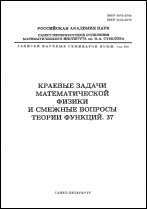|
|
Zapiski Nauchnykh Seminarov LOMI, 1984, Volume 135, Pages 76–86
(Mi znsl4758)
|
 |
|
 |
A derivation of the Cartwright–Levinson theorem from the theorem of Kolmogorov
P. Kusis
Abstract:
An entire function $f$ of exponential type is said to
belong to the Cartwright class $C$ if
$$
\int_{-\infty}^{+\infty}\frac{\log^+|f(x)|}{1+x^2}\,dx<+\infty.
$$
Let $N_+(r)(N_-(r))$ denote the number of zeros of $f$ in $|z|\leqslant R$ with $\operatorname{Re}z\geqslant0$ ($\operatorname{Re}z<0$ respectively). A
simple proof, based on the weak type (1.1) Kolmogorov inequality,
of the following important result is given.
Theorem. Let $f\in C$ и $\displaystyle\varlimsup_{y\to+\infty}\frac{\log |f(iy)|}y=\varlimsup_{y\to-\infty}\frac{\log |f(iy)|}{|y|}=a$. Then
$$
\lim_{r\to+\infty}\frac{N_+(r)}r=\lim_{r\to+\infty}\frac{N_-(r)}r=\frac a\pi.
$$
Citation:
P. Kusis, “A derivation of the Cartwright–Levinson theorem from the theorem of Kolmogorov”, Investigations on linear operators and function theory. Part XIII, Zap. Nauchn. Sem. LOMI, 135, "Nauka", Leningrad. Otdel., Leningrad, 1984, 76–86
Linking options:
https://www.mathnet.ru/eng/znsl4758 https://www.mathnet.ru/eng/znsl/v135/p76
|

| Statistics & downloads: |
| Abstract page: | 150 | | Full-text PDF : | 59 |
|




 Contact us:
Contact us: Terms of Use
Terms of Use
 Registration to the website
Registration to the website Logotypes
Logotypes








 Citation in format
Citation in format 